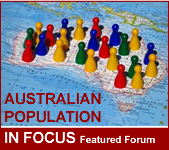Leaders gather for Population Summit

It is obvious population growth will have a major impact on development and industrialisation, infrastructure planning, job creation and the wider national economy. What is much less obvious is now we manage and create an Australian population that maintains a vibrant economy, a living, healthy environment and a culture we can be proud of.
The Global Access Partners National Economic Review: Annual Growth Summit, being held today (16 September), brings together some of the brightest minds in Australia.
We will focus on these key issues around population as we aim to not only discuss our future and the impact of a larger population, but develop the framework to address these questions and plan for a larger Australia.
The Summit follows last year’s successful National Economic Review which highlighted Australia’s ‘low productivity performance’ and a lack of spending on infrastructure as serious inhibitors of economic growth. It also emphasised the positive aspects of using new parameters to measure economic and social progress.
In the lead-up to this year’s Summit, GAP has utilised its pioneering “Second Track” process to coordinate an extensive stakeholder consultation. A number of advisory bodies have been established to facilitate economic policy research, support the Summit’s goals and maximise its long-term impact.
Commercialising Australian Ideas
 Approaches the Australian Government may adopt to encourage aspirational business culture and champion SME-led innovation are being debated by the Advisory Group on Commercialising Australian Ideas. This committee includes high-ranking government officials and prominent business leaders and meets four times a year under the auspices of GAP. Australian innovation currently lags well behind comparable OECD countries, and the Advisory Board is considering new policies to drive opportunities for entrepreneurial innovation and support the commercialisation of Australian intellectual property. Australian expertise and technological innovations will continue to languish without targeted strategies within local and international markets.
Approaches the Australian Government may adopt to encourage aspirational business culture and champion SME-led innovation are being debated by the Advisory Group on Commercialising Australian Ideas. This committee includes high-ranking government officials and prominent business leaders and meets four times a year under the auspices of GAP. Australian innovation currently lags well behind comparable OECD countries, and the Advisory Board is considering new policies to drive opportunities for entrepreneurial innovation and support the commercialisation of Australian intellectual property. Australian expertise and technological innovations will continue to languish without targeted strategies within local and international markets.
Progress in Society

 Australian measures of life satisfaction have declined in recent years, despite solid growth in GDP. In line with the 2010 Summit’s recommendations and international initiatives such as the OECD’s Commission on the Measurement of Economic Performance and Social Progress, the Task Force on Progress in Society is exploring how the ‘economics of happiness’ can inform national policy. The project will develop the work of recent studies which argue that traditional economic indicators such as GDP are incomplete statements of national ‘wellbeing’ and that governments and policy makers should take broader measures of the quality of life into consideration.
Australian measures of life satisfaction have declined in recent years, despite solid growth in GDP. In line with the 2010 Summit’s recommendations and international initiatives such as the OECD’s Commission on the Measurement of Economic Performance and Social Progress, the Task Force on Progress in Society is exploring how the ‘economics of happiness’ can inform national policy. The project will develop the work of recent studies which argue that traditional economic indicators such as GDP are incomplete statements of national ‘wellbeing’ and that governments and policy makers should take broader measures of the quality of life into consideration.
Cloud Computing
 Created by GAP in collaboration with the Department of Broadband, Communications and the Digital Economy, the Task Force on Cloud Computing discussed domestic public policy issues arising from the adoption of Cloud Computing, with a particular focus on industry development opportunities, consumer and small business protection, security and privacy. The group released its final report in May 2011, after which a one-day executive workshop was held in Sydney on 24 June. The Task Force highlighted the potential for the Cloud, in combination with the National Broadband Network, to drive transformational change in both Australia’s economy and society. GAP is now establishing a National Standing Committee on Cloud Computing to inform ongoing regulatory processes relating to Australia’s digital environment.
Created by GAP in collaboration with the Department of Broadband, Communications and the Digital Economy, the Task Force on Cloud Computing discussed domestic public policy issues arising from the adoption of Cloud Computing, with a particular focus on industry development opportunities, consumer and small business protection, security and privacy. The group released its final report in May 2011, after which a one-day executive workshop was held in Sydney on 24 June. The Task Force highlighted the potential for the Cloud, in combination with the National Broadband Network, to drive transformational change in both Australia’s economy and society. GAP is now establishing a National Standing Committee on Cloud Computing to inform ongoing regulatory processes relating to Australia’s digital environment.
Complex Project Management
 A joint venture of GAP and the International Centre for Complex Project Management, the International Complex Project Management Task Force is a group of senior business and government executives from Australia and around the world, established to investigate factors critical to the success of complex projects and outline a roadmap for complex project management in government and industry. The Task Force’s final report, to be released in Canberra in October 2011, offers a range of perspectives on complexity and provides 100 recommendations for innovative organisational and delivery approaches. The Task Force lay the foundations of the International Complex Project Management Specialist Research Centre – a permanent body fostering global collaboration, stimulating debate and leading strategic research into complex project management.
A joint venture of GAP and the International Centre for Complex Project Management, the International Complex Project Management Task Force is a group of senior business and government executives from Australia and around the world, established to investigate factors critical to the success of complex projects and outline a roadmap for complex project management in government and industry. The Task Force’s final report, to be released in Canberra in October 2011, offers a range of perspectives on complexity and provides 100 recommendations for innovative organisational and delivery approaches. The Task Force lay the foundations of the International Complex Project Management Specialist Research Centre – a permanent body fostering global collaboration, stimulating debate and leading strategic research into complex project management.
Primary Health Care and the Private Patient Journey
 Private providers deliver the majority of primary health care in Australia, yet much of the debate about reform has focused on the public sector. In March 2011, the Australian Centre for Health Research (ACHR) and GAP brought together thought leaders from primary health care, private hospitals, private health insurance and consumer health organisations to address issues related to private health reform, in a workshop "Primary Health Care and the Private Patient Journey”. The workshop explored the challenges and concerns raised in an extensive stakeholder consultation commissioned by ACHR. The planning is underway for a follow-up conference to continue the conversation on e-health, service gaps, the expanding role of health funds and better advocacy of the private sector’s role in pursuing quality of care.
Private providers deliver the majority of primary health care in Australia, yet much of the debate about reform has focused on the public sector. In March 2011, the Australian Centre for Health Research (ACHR) and GAP brought together thought leaders from primary health care, private hospitals, private health insurance and consumer health organisations to address issues related to private health reform, in a workshop "Primary Health Care and the Private Patient Journey”. The workshop explored the challenges and concerns raised in an extensive stakeholder consultation commissioned by ACHR. The planning is underway for a follow-up conference to continue the conversation on e-health, service gaps, the expanding role of health funds and better advocacy of the private sector’s role in pursuing quality of care.
Tertiary Music Education
 The Tertiary Music Education Task Force is an international forum of high-level representatives from academia, the artistic community, government, business and not-for-profit organisations convened by GAP to examine the current state of tertiary music education in Australia. The group assessed the repercussions of the major structural change which occurred when conservatoria were amalgamated with universities as part of the Dawkins educational reforms in the 1990s. It reviewed proposals for reform recently put before the Australian Government and addressed specific challenges facing the sector. The Task Force’s report, scheduled for public release in late September 2011, sets out how Australian tertiary music education can be revitalised at relatively little cost to the benefit of the cultural and economic health of the nation.
The Tertiary Music Education Task Force is an international forum of high-level representatives from academia, the artistic community, government, business and not-for-profit organisations convened by GAP to examine the current state of tertiary music education in Australia. The group assessed the repercussions of the major structural change which occurred when conservatoria were amalgamated with universities as part of the Dawkins educational reforms in the 1990s. It reviewed proposals for reform recently put before the Australian Government and addressed specific challenges facing the sector. The Task Force’s report, scheduled for public release in late September 2011, sets out how Australian tertiary music education can be revitalised at relatively little cost to the benefit of the cultural and economic health of the nation.
We hope that this year’s National Economic Review will see similar success and the creation of more advisory bodies to help facilitate change in the important area of Population Growth. You can follow today’s Summit on Twitter at #populationsummit.
_______________________________________
Lisa Middlebrook is Executive Manager Strategy & Policy, at Global Access Partners (GAP). Previously Lisa spent two years as Director of the Federal Labor Business Forum, and prior to that, she served as the Director of Business Development at the Lowy Institute. Lisa spent six years with the Democratic Leadership Council (DLC) and Progressive Policy Institute in Washington DC where she was a Senior Adviser on trade policy and was also responsible for external relations with the corporate community and non-profit foundations. She was instrumental in helping establish political relationships for Australia with regard to the US/Australia Free Trade Agreement. Prior to the DLC, she served at the Australian Embassy in Washington working on US Congressional Relations and trade issues. Lisa is a graduate of the University of California Los Angeles (political science and international relations) and serves on the Board of Directors of the Johnny Warren Foundation and the organising committee for the Steve Waugh Foundation.
Contact lmiddlebrook@globalaccesspartners.org
For more information on GAP and its public policy research programme, please visit www.globalaccesspartners.org or call on +61 2 8303 2420.
Lisa Middlebrook is Executive Manager Strategy & Policy, at Global Access Partners (GAP). Previously Lisa spent two years as Director of the Federal Labor Business Forum, and prior to that, she served as the Director of Business Development at the Lowy Institute. Lisa spent six years with the Democratic Leadership Council (DLC) and Progressive Policy Institute in Washington DC where she was a Senior Adviser on trade policy and was also responsible for external relations with the corporate community and non-profit foundations. She was instrumental in helping establish political relationships for Australia with regard to the US/Australia Free Trade Agreement. Prior to the DLC, she served at the Australian Embassy in Washington working on US Congressional Relations and trade issues. Lisa is a graduate of the University of California Los Angeles (political science and international relations) and serves on the Board of Directors of the Johnny Warren Foundation and the organising committee for the Steve Waugh Foundation.













